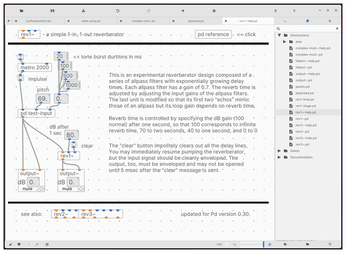FOSSPicks
Audio plugin
PlugData
The world of audio processing is incredibly complex. For that reason, many of us rely on other, cleverer people to develop the algorithms and software, and to package those up as plugins we can use with our favorite audio software. But there are also a few applications that can help with algorithm development without requiring a postgraduate degree in digital signal processing. And the best of these is Pure Data. Pure Data is a visual programming language that was designed for audio and control message processing. You join inputs and outputs together with a little scripting, but you can equally load and hack on hundreds of preexisting patches, algorithms, and documented examples. It's a powerful tool for generating your own sounds and effects, and it became the inspiration for the industry standard (non-open source and non-Linux) Max by Cycling '74. This in turn even led to the creation of Max for Live, an enviable integrated plugin and programming environment for Ableton Live on Windows and macOS.
Despite the availability of patches and modifications, Pure Data patches still need Pure Data running, and this solution doesn't work too well with other audio applications. Which is where PlugData can help. It's a version of Pure Data that wraps its functionality inside the JUCE plugin framework so your patches can be built and used directly as plugins. It will turn any audio plugin host into a modular and programmable audio processor, much like the aforementioned Max for Live, and is something we've never had access to in the Linux audio world. Lots of objects are included, and you can import your own patches and do everything you normally can in Pure Data. It works as you would expect, including MIDI and OSC data processing, making PlugData a fully fledged version of Pure Data where it's most useful – directly inside the audio path of a recording or producing system.
Project Website
https://github.com/timothyschoen/PlugData

Package manager
Buy this article as PDF
(incl. VAT)
